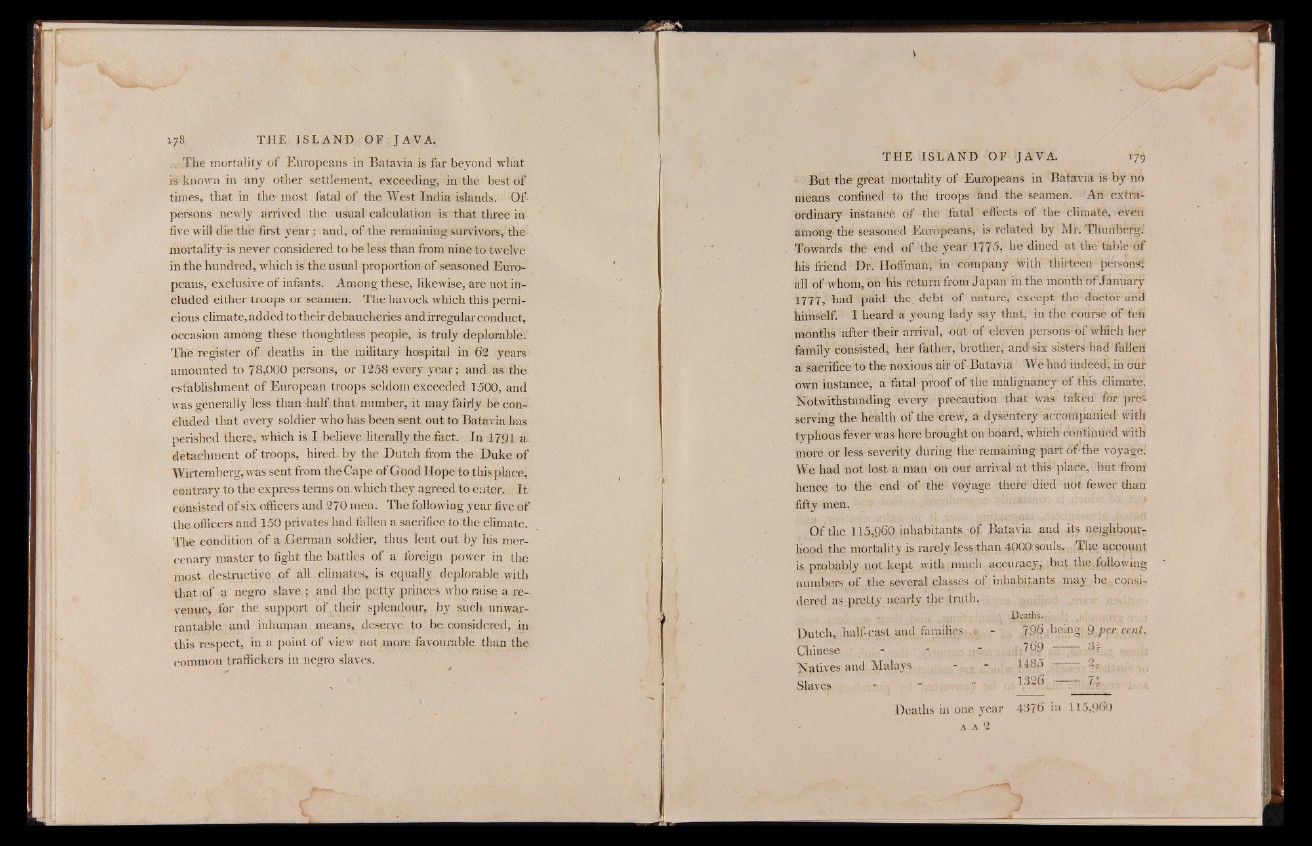
,. The mortality of Europeans in Batavia is far beyond what
is known in any other settlement, exceeding, in the best of
times, that in the most fatal of the West India islands. Of
persons newly arrived the usual calculation is that three in
five will die the first year ; and, of the remaining survivors, thè-
mortali ty is never considered to be less than from nine to twelve
in the hundred, which is the usual proportion of seasoned Europeans,
exclusive of infants. Among these, likewise, are not included
either troops or seamen. The bavock which this pernicious
climate, added to their debaucheries and irregular conduct,
occasion among these thoughtless people, is truly deplorable.
'The register of deaths in the military hospital in 62 years
amounted to 78,000 persons, or 1258 every year ; and as the
establishment of European troops seldom exceeded 1500, and
was generally less than -half that number, it may fairly be concluded
that every soldier who has been sent out to Batavia has
perished there, which is I beheve literally the fact. In 1791 a
detachment of troops, hired- by the Dutch from the Duke of
Wirtem berg, was sent from the Cape of Good Hope to this place,
contrary to the express terms on. which they agreed to enter. I t
consisted of six. officers and 270 men. The following year five of
the officers and 150 privates had fallen a sacrifice to the climate.
The condition of a .German soldier, thus lent out by his mercenary
master to fight the battles of a foreign power in the
mqst destructive of all climates, is equally deplorable with
that of a negro slave ; and the petty princes who raise a revenue,
for the support of. their splendour, by such unwarrantable
and inhuman means, deserve to be considered, in
this respect, in a point of view not more favourable than the
common traffickers in negro slaves.
But the great mortality of Europeans in Batavia is by no
means confined to the troops find the seamen. An extraordinary
instance of the fatal effects of the climate, even
among the seasoned Europeans*1 is related by Mr. Thunbergi
Towards the end of the year 1775* he dined at the table of
his friend Dr. Hoffman, in company with thirteen persons;
all of whom, on his return from Japan in the month of January
1777, had paid the debt of nature, except the doctor and
himself. I heard a young lady say that, in the course of ten
months after their arrival, out of eleven persons of which her
family consisted, her father, brother, and six sisters had fallen
a sacrifice to the noxious air of Batavia Wehad indeed, in our
own instance, a fatal proof of the malignancy of this ¿limate:
Notwithstanding every precaution that was taken for pre1
serving the health of the crew, a dysentery accompanied with
typhous fever was here brought on board, which continued with
more or less severity during the remaining part of-the voyage.1
We had not lost a man on our arrival at this place, but from
hence to the end of the voyage there died not fewer than
fifty men.
Of the 115,960 inhabitants-of Batavia and its neighbourhood
the mortality is rarely less than 4000 souls. The account
is probably not kept with much accuracy, but the following
numbers of the several classes of inhabitants may be considered
as pretty nearly the truth.
1 Deaths, t.
Dutch, half-cast and families . ■ - 79^,¡being; 9 per cent..
Chinese - jjj , - — - - ,'.^69 7 3i ,
Natives and Malays - - 1485 •’••• - -V
Deaths in one year 4376 in 115,960
A A 2